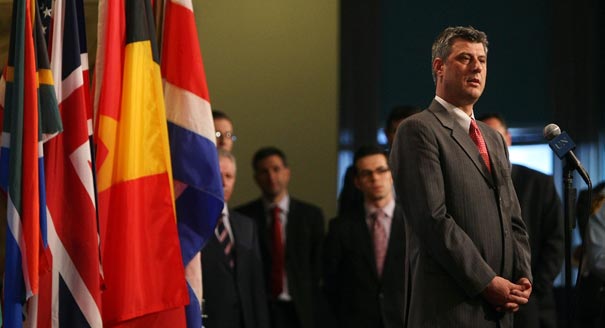Stefan Lehne

Source: Getty
Serbia-Kosovo Deal Should Boost the EU’s Western Balkans Policy
The Serbia-Kosovo agreement proves that clever diplomacy combined with the power of the prospect of EU enlargement can still deliver significant results.
The agreement reached between Serb Prime Minister Ivica Dačić and Kosovar Prime Minister Hashim Thaci on April 19, 2013, is certainly a big deal. It is set to establish a power-sharing arrangement in the north of Kosovo with authorities that are acceptable to both sides—up until now, the Serb-majority northern territories were run by authorities supported by Belgrade, but they rejected Pristina’s rule. The agreement will enhance local self-government through an association of Serb-majority municipalities and institute new arrangements for the police and the judiciary.
All this will—if correctly implemented—represent an important step toward more normal relations between Serbia and Kosovo and should help to defuse one of the remaining hot spots in the Western Balkans.
The agreement also vindicates the EU’s overall policy toward the Western Balkans. Resolving the region’s remaining political and security problems and supporting the Western Balkan countries on their way to the EU are mutually reinforcing processes. The EU must pursue them together. If the people of the region are confident that they will eventually join the European mainstream, they have a good chance of settling their differences. If they lose faith in a better future in the EU, they are likely to preserve their grudges and divisionsAs the EU faces enlargement fatigue and prospective members tire of endless reform processes, the Kosovo-Serbia dialogue offers important lessons.
Success in the Balkans
At the core of the Kosovo-Serbia talks was the search for a fair balance between two legitimate concerns. On one side was the Kosovo Serbs’ need for guarantees that they can preserve their way of life and maintain their ties to Serbia. On the other was Pristina’s need to have Belgrade accept that the north is and will remain part of Kosovo. While both sides had much to gain from resolving this problem, the legacy of mistrust and hostility weighed heavily and presented huge obstacles to a genuine dialogue.
What finally brought the prime ministers to Brussels for ten rounds of talks was their strong interest in making progress toward the EU. Belgrade had its sights on the bigger prize: the green light for EU accession negotiations. Kosovo too expected that cooperation in the dialogue would be rewarded by progress toward a Stabilization and Association Agreement and on visa liberalization with the EU.
This meant the dialogue had a strange dual nature. It was about resolving open problems between long-term adversaries, but it was also about meeting the conditions necessary to make further progress toward the EU. This formula had a downside, which became evident in the final stages of the negotiations. The Belgrade government displayed a tendency to falsely present the EU mediation efforts as some kind of diktat that forced Belgrade to choose between submission and international isolation.
Yet, altogether, EU conditionality proved to be an essential catalyst in the negotiations. Continued active EU involvement will also be crucial to turn the short agreement on principles into a practical reality. The deal met with considerable criticism in both countries, and the Serb population in the north will be difficult to convince of its merits. Belgrade will need to use its considerable powers of persuasion to bring the local population on board, and Pristina will have to reach out in a credible manner. Improving the economic prospects of Kosovo’s northern region will be a key argument in this context.
The full normalization of bilateral relations between Serbia and Kosovo is still years away. For the time being, Belgrade is not ready to recognize Kosovo. In the final stages of the negotiation it was proposed that Serbia should give up its resistance to Pristina’s membership in international organizations, but this was rejected by Belgrade. Still, the agreement, together with the earlier results of the dialogue, offers a framework for ongoing communication and practical cooperation. And that should make it easier to complete the journey when the time comes.
In reaching this agreement the leadership of Serbia and Kosovo displayed realism and responsibility. They moved beyond the logic of conflict and enmity and focused on the genuine future interests of their countries. Particularly in Belgrade it turned out that leaders with nationalist profiles found it easier to tackle tough territorial disputes than to moderate personalities. Within just a few months, the new coalition led by former associates of Serbian strongmen Slobodan Milosevic and Vojislav Šešelj moved further on the Kosovo file than its pro-European predecessor had in years.
For EU High Representative Catherine Ashton, who devoted a lot of energy to this issue and displayed great mediation skills, the breakthrough amounts to a personal triumph. Consistent U.S. support behind the scenes was also essential. The EU is now indisputably in the lead on the Balkans, but when it comes to difficult steps, U.S. help remains fundamental.
That the EU, despite its own deep divisions over Kosovo—five member states have still not recognized its independence—could mediate effectively between Belgrade and Pristina is also the result of Germany’s strong leadership role, which one does not see often in the field of foreign policy. Germany is one of the few countries among the 27 that requires that its parliament take a special decision on the opening of new EU accession negotiations. Berlin used this leverage to help define the criteria for the beginning of talks with Serbia and thereby greatly strengthened Ashton’s hand in the dialogue.
A Process at Risk of Stalling
The process that helped make this agreement possible began ten years ago at a summit in Thessaloniki. There, representatives of the EU and the Western Balkans declared that the future of the countries of the region would lie with the EU. Today, that promise is the most powerful policy instrument deployed by the EU in the region
The Stabilization and Association Process—essentially a somewhat elongated version of the EU enlargement process that was reinforced at the summit—provides a comprehensive roadmap toward accession. Every Western Balkan country moves toward the EU through a series of steps, each conditioned on progress on reforms, that is closely monitored by the European Commission.
With its accession this summer, Croatia will be the first country to complete the long journey to membership. Yet there can be no doubt that in a number of countries in the region, the Stabilization and Association Process is running out of steam and losing traction.
One particular problem is that for most governments, the objective of accession is very far away. Enlargement is getting more difficult all the time. The EU legislation that must be adopted by a new member state has increased to 140,000 pages. Much more emphasis is placed on implementation, and negotiation chapters are only closed if the EU is satisfied that the candidate country is actually capable of implementing the relevant EU legislation correctly.
That is part of the reason why Croatia’s accession process took ten years. And it is clear now that after Croatia (and potentially Iceland), there will be no further enlargement before 2020. Accession undoubtedly remains a big carrot, but several of the Balkan countries perceive it only as a tiny orange speck on the horizon. For governments that naturally think in terms of electoral mandates, such a distant objective has limited pull.
The financial and debt crisis that has preoccupied the EU for the past two years is another reason interest is dwindling. The crisis has eroded public and political support for enlargement in the EU member states, and there is little active communication by EU governments to explain the need for the process. Many EU citizens instinctively feel that an organization in such trouble should not consider adding new members. If the house is on fire, why build a new wing?
The crisis has also undermined the attractiveness of the EU’s offer in the region itself. The current deep problems of Greece, Slovenia, Bulgaria, and Romania—all struggling with the combined effects of the financial crisis and weak governance—shed an entirely new light on the potential consequences of membership. The traditional narrative that equated EU accession with prosperity and stability has lost its credibility. Polls indicate that support for EU membership, which until recently was high throughout the region, has begun to decline significantly. In a number of countries, this loss of confidence has already slowed down the reform process.
This state of affairs is not helped by the dire economic situations in the Western Balkans. All the countries of the region except Albania saw negative growth in 2012. Foreign direct investment has plummeted since 2008. Paradoxically, the more advanced countries have suffered the most as they have been more exposed to the euro-crisis contagion.
That the process has not come to a complete halt is partly due to inertia. The EU, like a big ocean liner, does not change direction easily, and the European Commission has kept up the momentum as well. The body has the leading role on enlargement and continues to implement its mandate irrespective of the prevailing political climate.
The powerful and well-funded enlargement machine of the European Commission is clearly fully focused on the Western Balkans. However, the member states remain the main decisionmakers on enlargement, and they are increasingly reluctant to follow the Commission—some of them perceive the body to be less an honest broker and more a self-interested party. Several of the neighboring EU member states that should have a particular interest in the advancement of the Western Balkans toward the EU also unfortunately tend to block or slow down the process by pushing their own bilateral concerns with individual Western Balkan countries.
No Other Options
Yet, in spite of this difficult situation and the overall accession malaise, the fact remains that for the Western Balkan states, there is no plausible alternative strategy to pursuing EU membership.
These countries are already very economically close to the EU and surrounded on all sides by member states. Certainly, other countries have become more active in the region—such as Russia, China, and Turkey—and their economic and political influence could increase. However, compared to the level of engagement of the EU, their overall role remains extremely modest. The EU, despite all its current problems, is the only game in town and an indispensable partner for modernization and economic development.
Meanwhile, the EU is so heavily invested in the region and so exposed to risks and problems arising from it that there is simply no exit strategy available. The opportunity cost of abandoning the Thessaloniki promise of full EU membership in terms of loss of influence and increased instability would be devastating.
Therefore, the real danger is not primarily that the process will stop altogether. Rather, it is that enlargement fatigue in the EU could spill over into reform fatigue in the region. The process could then degenerate into a kind of double bluff in which the EU just pretends to remain open to further accession and the Western Balkan states pretend to reform.
This loss of momentum became evident this spring when the European Commission’s plan to allow several Western Balkan countries to move toward the next rung in the accession ladder ran into trouble.
On Macedonia, the Commission advocated beginning accession talks this spring. Instead, the country entered into political turmoil last December with the opposition leaving the parliament and threatening a boycott of local elections. EU Enlargement Commissioner Stefan Füle achieved a breakthrough in resolving this crisis in March 2013. Still, the overall picture remains quite gloomy, with interethnic relations deteriorating and the dispute with Greece over the name of the country unlikely to be resolved soon.
The objective for Albania was to get the country to candidate status. But there too the political climate is heating up ahead of parliamentary elections later this year. The deeply divided political elite seems incapable of embracing the reform agenda in a credible fashion.
The EU hoped that Bosnia and Herzegovina would have achieved the conditions necessary to submit a membership application. Key among them is the implementation of the Sejdić-Finci judgment of the European Court of Human Rights. The state’s constitution currently prohibits those who are not Bosniaks, Serbs, or Croats from serving in high public offices; implementation of the judgment would allow them to do so. Work on this question is ongoing, but the outcome is highly uncertain.
Thus the outlook for the Commission’s ambitious agenda for 2013 looks relatively bleak at the moment. The Belgrade-Pristina breakthrough appears to be the only piece of good news from the Western Balkans. But the agreement could serve as a genuine game changer for the EU’s policies toward the region.
The measures agreed to will not only promote cooperation between Belgrade and Pristina and alleviate tensions in northern Kosovo, they will also amount to a significant gain for the region as a whole. They should spur Kosovo’s political and economic development and enhance the potential for regional cooperation among the Western Balkan countries.
If the agreement leads to the opening of accession negotiations with Serbia this should, together with Croatia’s upcoming EU accession, over time also change the political dynamics in Bosnia and Herzegovina. The influence of neighbors firmly on the EU track should improve the chances that Bosnia and Herzegovina too will finally overcome the obstacles it faces and start moving on its own way toward Brussels.
Revitalizing the Process
The EU’s success on the Serbia-Kosovo issue has demonstrated that clever diplomacy combined with the power of the prospect of EU enlargement can still deliver significant results. This success should spur the EU to reenergize its engagement in the Western Balkans and adjust its policies to changing regional circumstances. In reenergizing its policy, the EU should focus on the places that are lagging behind and where the existing approach risks losing traction—namely Macedonia, Albania, and Bosnia and Herzegovina as well as Kosovo.
An acceleration of the accession process is not an option in view of the structural problems of these nations, and the EU’s current struggles will also hinder rapid progress. Instead, the objective must be to ensure that the promise of accession remains—or rather becomes again—a strong engine for economic development, improved governance, and progress in the rule of law.
The best way to achieve this would be to initiate accession negotiations with all the remaining countries as soon as possible, ideally within the next two to three years. Even earlier than that, all countries could be involved in the process of screening the EU legislation, which traditionally forms the first stage of membership negotiations.
Should the EU move toward such an approach, it should make clear that it does not imply earlier accession dates. The negotiation process would be at least as rigorous as the one with Croatia, and progress would be strictly based on individual merit. Such a move should also by no means be understood as abandoning conditionality. On the contrary, it would aim to broaden and deepen conditionality.
The EU’s current conditionality policy often focuses on particular items, such as the delivery of suspected war criminals to The Hague (in the cases of Croatia and Serbia), constitutional reform (in the case of Bosnia and Herzegovina), or normalization with Kosovo (in the case of Serbia). Sometimes this approach works, and sometimes it does not, but it always has the disadvantage of distracting from many of the other items on the reform agenda.
Certainly, the European Commission regularly reports on the progress made on all aspects of the accession criteria. However, if there is a clear understanding that one benchmark is much more important than any other, this reduces the incentives for broad reform efforts.
The example of earlier enlargements, including that of Croatia, has shown that only accession negotiations have a truly transformative impact on state institutions. The Commission engages the local administration in a systematic manner and in depth over a number of years. The concrete requirements for institutional and legislative changes to ensure the implementation of EU law are identified in great detail chapter by chapter and in a process that involves large parts of the state administration. Progress is monitored on an ongoing basis and supported by targeted assistance projects.
Over time, this intensive technical interaction between the Commission and the candidate countries produces better laws, stronger institutions, and a convergence of standards with the EU. It is a powerful argument in favor of beginning accession talks for all these countries sooner rather than later.
The EU must also make sure that its policies in the Western Balkans address the topmost concern of the region—without doubt the lack of economic growth and rising unemployment. In view of the EU’s budgetary constraints, there is little scope for significantly increased funding for the region. But the EU can restructure its funding allocation.
Whereas institution building has in recent years been the central priority of EU support, it now makes sense to place equal emphasis on the development of infrastructure and to do so in close partnership with international financial institutions. Developing cross-border infrastructure creates employment, binds the region together, and visibly demonstrates the EU’s engagement. There is also a strong case for intensifying regional economic cooperation and for reducing the barriers constraining regional trade.
Finally, the success of the Belgrade-Pristina dialogue offers an excellent occasion to renew efforts to publicly make the case for the continuation of the enlargement process. Recently, EU institutions and the few pro-enlargement governments appeared to favor “enlargement by stealth,” keeping the process on track but reducing its public profile to the minimum. While convenient in the short term, such an approach involves great risks in the longer term. If the public is wholly unprepared, important steps toward accession will not be sufficiently supported in governments and parliaments.
The Belgrade-Pristina dialogue proves that the EU has the experience, the instruments, and the right strategy to help the Western Balkan countries meet the challenges at hand. It also demonstrates that the promise of future accession made ten years ago continues to be an indispensible force for good in the region.
What is needed now is the determination and staying power to bring this process to its successful conclusion.
About the Author

Senior Fellow, Carnegie Europe
Stefan Lehne is a senior fellow at Carnegie Europe in Brussels, where his research focuses on the post–Lisbon Treaty development of the European Union’s foreign policy, with a specific focus on relations between the EU and member states.
- What Can the EU Do About Trump 2.0?Article
- Can the EU Meet the Trump Moment?Commentary
Stefan Lehne
Recent Work
Carnegie does not take institutional positions on public policy issues; the views represented herein are those of the author(s) and do not necessarily reflect the views of Carnegie, its staff, or its trustees.
More Work from Carnegie Endowment for International Peace
- Is a Conflict-Ending Solution Even Possible in Ukraine?Commentary
On the fourth anniversary of Russia’s full-scale invasion, Carnegie experts discuss the war’s impacts and what might come next.
- +1
Eric Ciaramella, Aaron David Miller, Alexandra Prokopenko, …
- The Kremlin Is Destroying Its Own System of Coerced VotingCommentary
The use of technology to mobilize Russians to vote—a system tied to the relative material well-being of the electorate, its high dependence on the state, and a far-reaching system of digital control—is breaking down.
Andrey Pertsev
- Taking the Pulse: Can European Defense Survive the Death of FCAS?Commentary
France and Germany’s failure to agree on the Future Combat Air System (FCAS) raises questions about European defense. Amid industrial rivalries and competing strategic cultures, what does the future of European military industrial projects look like?
Rym Momtaz, ed.
- Notes From Kyiv: Is Ukraine Preparing for Elections?Commentary
As discussions about settlement and elections move from speculation to preparation, Kyiv will have to manage not only the battlefield, but also the terms of political transition. The thaw will not resolve underlying tensions; it will only expose them more clearly.
Balázs Jarábik
- How Middle Powers Are Responding to Trump’s Tariff ShiftsCommentary
Despite considerable challenges, the CPTPP countries and the EU recognize the need for collective action.
Barbara Weisel











